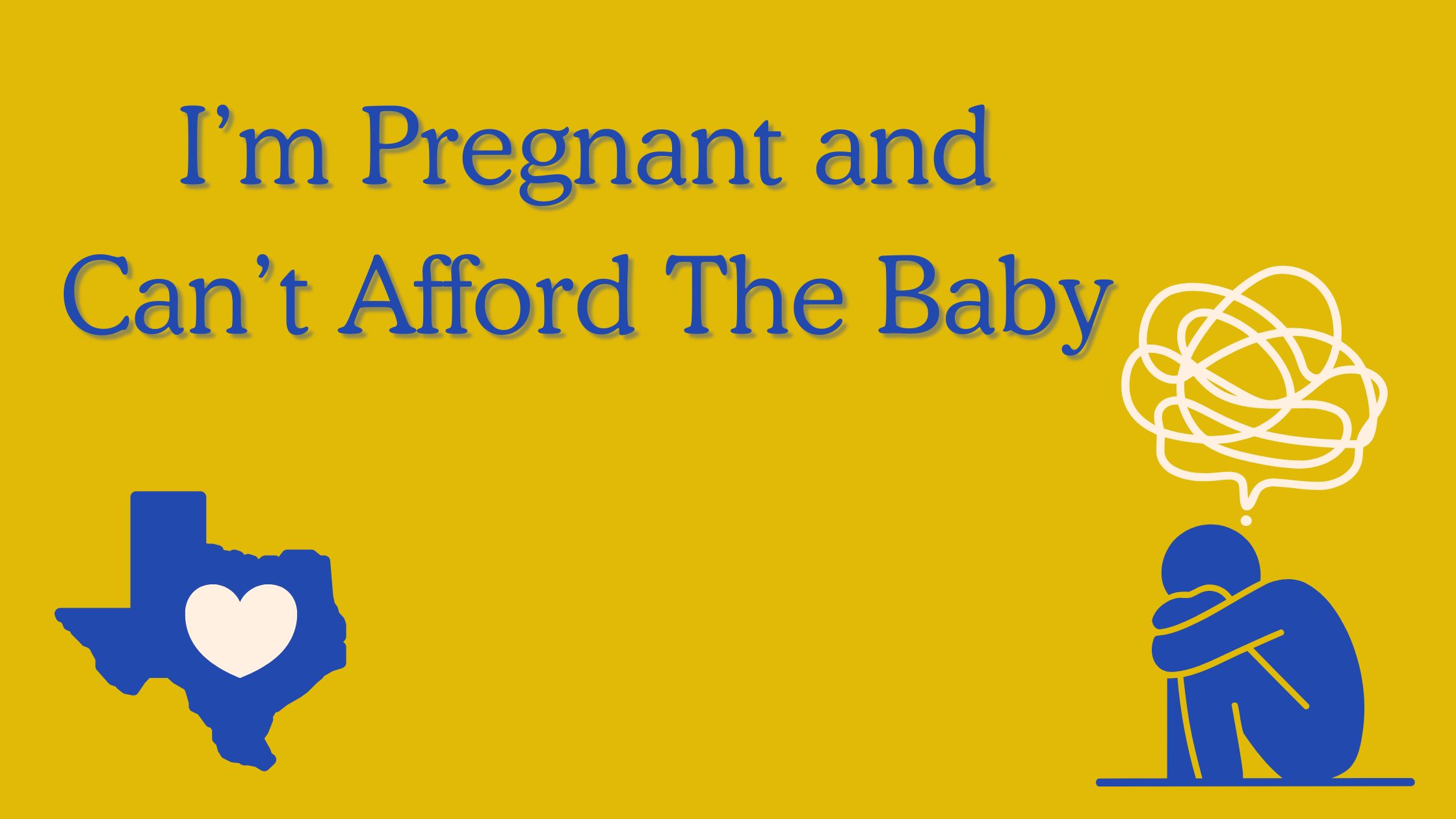
Finding out you’re expecting can come with a rush of emotions—especially if your first thought is, “I’m pregnant and can’t afford the baby.” If you’re facing an unexpected pregnancy, you’re not alone, and you’re not out of options. The financial weight you’re carrying is real, but there are practical steps, caring people, and resources that can help you sort through pregnancy and financial options at your own pace.
At Texas Adoption Center, we meet people in all kinds of situations—students finishing a semester, moms already caring for little ones, women starting a stable job, and those between jobs. No matter your current situation, you deserve a comfortable and confidential place to ask questions, get financial help, and explore what feels right for you. That might include parenting with support, short-term assistance, or learning more about adoption—without pressure.
Quick definition: When we talk about “affording a baby,” we are discussing three stages—immediate pregnancy costs (appointments, transportation, delivery), newborn essentials, and ongoing needs like housing, childcare, and medical care (including health coverage and health insurance).
First—your concern is valid (and you have time)

It’s normal to feel overwhelmed, scared, or even frozen when money is tight. Many pregnant women tell us they feel like everything must be decided today. It doesn’t. Take a breath. You can make good choices one step at a time, even when finances play a large role in your decision.
Start by separating what’s urgent from what can wait. Urgent might look like scheduling prenatal care, asking about coverage options, or talking to someone who’s a good listener and won’t judge. Later decisions—like long-term childcare or whether to parent or consider adoption—can follow once you’ve gathered information. If you’re unsure, we’ll walk with you, explain programs for low-income families, and help you understand the difference between immediate relief and long-term planning.
Most importantly, your worth isn’t measured by a bank account. The fact that you’re here, looking for information and support, already shows how much you care about your child and your future. You have options—and you have time to decide which path fits your life, your values, and your unique circumstances.
What “Affording a Baby” Really Covers (and Where to Find Financial Help)
When you say, “I’m pregnant and can’t afford the baby,” it helps to break the costs into three buckets. Seeing the full picture makes pregnancy and financial options easier to compare and choose from. Below is a quick snapshot you can use as a starting checklist.
| Cost Bucket | Typical Needs | First Places to Explore |
| Immediate (Pregnancy) | Prenatal care, lab work, ultrasounds, transportation to regular in-person visits | Health coverage through Medicaid/CHIP-Perinatal or Marketplace health insurance; clinic payment plans; community programs |
| Newborn (First Weeks) | Safe sleep (crib/bassinet), car seat, diapers/wipes, feeding supplies for a new baby | Community closets, local nonprofits serving needy families, baby-item exchanges |
| Ongoing (Months 1–12+) | Housing, childcare, pediatric visits, maternity care follow-ups | Subsidized childcare, rent/utility assistance, sliding-scale clinics for low-income households |
The goal isn’t to handle everything today. Start with the most urgent items, then layer in financial assistance options as you learn what you’re eligible for.
Immediate Pregnancy Costs & Health Coverage
The first priority is your health and your baby’s health. If you’re wondering how to afford prenatal care, there are numerous programs designed to reduce costs for pregnant women—even if you’re between jobs or your financial situation has recently changed.
- Medical visits & testing: Ask clinics about sliding-scale fees and payment plans for prenatal care. Many community clinics can help you apply for health coverage and schedule the most essential appointments first.
- Insurance pathways: Depending on eligibility, Medicaid/CHIP-Perinatal or Marketplace health insurance (via the Affordable Care Act) can lower costs for ultrasounds, screenings, and delivery.
- Transportation help: If getting to appointments is the biggest hurdle, ask about bus vouchers, gas cards, or rides through local partners and government organizations.
Remember: your well-being matters. Tackling medical care early can reduce complications later, lighten the financial burden, and keep more pregnancy options open.
Newborn Essentials for Needy Families
Preparing for a new baby doesn’t have to mean brand-new everything. Focus on safety and the few items you’ll use every day; you can add more as you feel ready.
- Safety first: A crib or bassinet and a properly fitted car seat are non-negotiables; many local nonprofits help low-income families access both.
- Feeding & diapers: Look for diaper banks, WIC nutrition support, and community exchanges. These financial pregnancy options can dramatically cut monthly costs for families.
- Smart sequencing: If you’re not sure what you’ll be able to afford before delivery, aim to secure the top two or three items first, then expand your list after you’ve given birth and understand what you truly use day to day.
Ongoing Expenses for Low-Income Households
After delivery, the budget shifts from one-time purchases to steady monthly costs. Planning now can protect your child’s life and your long-term goals.
- Housing & utilities: Ask about rent and utility relief, especially if your current situation is temporary. Short-term temporary assistance can keep you stable while you pursue a stable job or training.
- Childcare & work: Subsidized childcare can make returning to work possible; many programs consider unique circumstances and financial options beyond income alone.
- Healthcare after delivery: Postpartum visits and pediatric checkups may be covered or discounted under certain plans; look for clinics that serve low income families and accept Marketplace or Medicaid health insurance.
- Mental health & support: Your emotional health matters. Low-cost counseling and community groups can help you feel ready and keep the door open to future choices as your financial situation changes.
If, while mapping these costs, you decide parenting isn’t the best fit, that’s okay. You can still explore adoption pathways (including open and closed adoption, or semi-open adoption), choose an adoptive family, and design the level of contact you prefer—options we’ll cover next.
Your Realistic Options in Texas for Pregnant Women

No two situations are the same. Your pregnancy options should reflect your values, your financial situation, and the kind of future you want for yourself and your child. Below are three clear paths many women consider—each with real supports you can tap into today.
Parenting with Support: Health Insurance and Texas Programs
If your heart leans toward parenting but you’re worried you won’t be able to afford everything, there are numerous programs designed to help low income families and needy families bridge the gap. Think of this as financial assistance parenting—practical help so you can focus on your new baby and healing.
- Coverage & care: If you don’t have employer coverage, look into Medicaid/CHIP-Perinatal or Marketplace plans under the Affordable Care Act. This route can lower costs for prenatal care, delivery, and maternity care, especially when money is tight and finances play a big role in decisions about work and childcare.
- Everyday essentials: WIC and community partners can help with nutrition, formula or breastfeeding support, and infant supplies; some government organizations also coordinate diapers, cribs, and car seats for qualifying households.
- Stability while you plan: If juggling bills is the biggest barrier, ask about rent, utility, or transportation support. The goal is to keep you safe and as financially stable as possible while you make big decisions about school, a dream job, or childcare.
You don’t have to navigate this alone. Our team can walk you through financial assistance options and health-plan choices so you can compare financial pregnancy options without pressure and decide what fits your life.
Temporary Assistance & Kinship Support
Sometimes you want to parent—but not right now. Temporary pathways can keep your long-term plan intact while you stabilize housing, finish school, or start a stable job.
- Kinship care: A trusted relative or friend cares for your baby short-term while you get back on your feet. You remain the legal decision-maker and keep your parental rights.
- Temporary guardianship: A time-limited legal arrangement that allows someone you choose to make day-to-day decisions for your child. It can reduce immediate stress without closing the door open to parenting later.
- Short-term relief: Local nonprofits and community groups offer services like transportation, meals, or help with appointments—practical support that helps you overcome challenges in the first weeks after you’ve given birth.
These options protect your bond with your baby and your long-term life goals, while offering enough support now to move toward a more independent life.
Adoption—an Empowering, Loving Choice
If parenting isn’t the right fit in your current situation, adoption might be. Adoption is not “giving up”—it’s a thoughtful plan that puts your baby’s stability first while honoring your reality. With Texas Adoption Center, you design the experience:
- You choose the family: Review profiles, meet potential adoptive parents, and select the adoptive family that matches your values and hopes for your child’s life.
- You choose the level of contact:
- Open adoption can include updates, photos, and even regular in-person visits—open adoption leaves space for an ongoing relationship when you and the adoptive family agree.
- Semi open adoption allows contact through the agency, which some women find more comfortable.
- Closed adoption means there’s no ongoing contact; closed adoption can feel right for some families who want privacy. You can also compare open and closed adoption to see which fits best.
- You get real-world help: As allowed by Texas law, certain pregnancy-related expenses—like transportation, some medical needs, and housing, and limited legal or court costs—may be covered so you can focus on your health and recovery. Our specialists explain all our services in a comfortable and confidential place, answer questions, and keep the process confidential and compassionate.
Adoption gives many pregnant women room to breathe: you can be financially prepared for the future, keep your biggest supporters close, and still choose a loving home for your baby. Some find peace knowing the adoptive family they picked is financially stable and ready, while they work toward their own goals. Others feel relief simply having financial options that match their unique circumstances.
If you’re unsure which path is right, that’s okay. You don’t have to decide today. We’ll talk through your pregnancy options, outline next steps, and support you—without pressure—so you can choose what feels right when you feel ready.
Step-by-Step Plan for This Week (Tiny Wins That Lower Stress)

When finances play a big part in your choices, it helps to focus on small actions you can take right now. These steps won’t solve everything at once, but they’ll lower anxiety, bring financial help into reach, and keep all your pregnancy options on the table while you decide what feels right.
1) Talk to someone safe today
Choose one good listener—a trusted friend, a caseworker, or a Texas Adoption Center specialist—who can offer calm, practical support. You deserve a comfortable and confidential place to ask questions and sort through the big decisions ahead. If you prefer, start with a text or message rather than a phone call.
2) Book prenatal care and ask about coverage
Call a clinic and schedule your first prenatal care visit, even if money is tight. Ask what health coverage or health insurance you might qualify for (Medicaid/CHIP-Perinatal or a Marketplace plan under the Affordable Care Act) so you’re able to afford labs, ultrasounds, and essential checkups. Getting seen early protects your health during pregnancy and can reduce costs later.
3) Apply for practical programs now
Put in applications for WIC, housing/utilities aid, and transportation help. Many government organizations and community partners offer temporary assistance to pregnant women, low-income families, and needy families—think diaper banks, car-seat programs, or emergency vouchers. These financial assistance options can stabilize your financial situation while you plan.
4) Make a two-column essentials list
Divide a page into “What I need for my new baby” and “Where I’ll get it.” Start with a safe sleep space, car seat, diapers/wipes, and feeding supplies. Next to each item, note the program, person, or store that can help. This turns “I’m pregnant and can’t afford the baby” from a spiral into a checklist you can manage.
5) Sketch two scenarios—no pressure
Draft a simple one-page plan for (A) parenting with support and (B) adoption. For adoption, jot what you’d want in an adoptive family and the level of contact you prefer—open adoption, semi-open adoption, or closed adoption. This exercise doesn’t lock you in; it just clarifies your financial options and personal values so you can feel ready when it’s time to choose.
6) Outline a hospital day plan
Decide who you want in the room when you’ve given birth, what photos you’d like, and how you want the first moments handled. If you’re exploring adoption, include whether you’d like regular in-person visits later (if you choose an open path) and what an ongoing relationship might look like with the adoptive parents. Knowing your wishes now reduces stress later.
7) Protect your mental health daily
Set aside 10–15 minutes for grounding—slow breathing, a short walk, or journaling. These small resets help you overcome challenges and keep decisions clear. If anxiety spikes, reach out. There are services designed to support women in a confidential place while they weigh pregnancy and financial options and move toward an independent life that fits their life goals.
Emotional Wellbeing & Mental Health During Pregnancy

Money stress plus pregnancy can feel like too much at once. If you’re anxious, not sleeping, or cycling through worst-case thoughts, you’re not broken—you’re human. Many pregnant women find that naming the fear out loud and getting steady support makes the rest of the decisions easier. You deserve a comfortable and confidential place to process everything, and we can offer that.
Here are gentle ways to care for your mind while you sort through pregnancy options:
- One calm thing daily: Ten minutes of slow breathing, a short walk, or journaling can reset your nervous system and help you overcome challenges with more clarity.
- Limit the spiral: Pick a “worry window” (15–20 minutes). When fears pop up outside that window, jot them down and return to them later. This keeps big feelings from running your day.
- Talk to a good listener: A trusted friend, counselor, or Texas Adoption Center specialist can help you turn fog into a plan.
- Consider counseling: Short-term therapy (CBT, trauma-informed care) can reduce panic, improve sleep, and make space for decisions about parenting, adoption, or temporary assistance—at your pace.
- Care for your body: Hydration, simple meals, and rest support your mood. Small wins count.
If emotions feel heavy most days, or you’re struggling to function, reach out. Low-cost services and community programs exist specifically for women navigating financial stress and pregnancy. We can connect you with local resources and provide a confidential place to talk through how your financial situation intersects with your wellbeing.
Remember: your mental health matters as much as your budget. With the right support, you can make the big decisions when you feel ready—not rushed.
You’re Not a Bad Person if Motherhood Isn’t Your Choice Right Now

Choosing not to parent in your current situation does not make you selfish or uncaring—it makes you honest about your unique circumstances and thoughtful about your child’s future. Many women face big decisions during pregnancy, and love can look like different paths: parenting with support, waiting until you feel ready, or creating an adoption plan that gives your baby stability from day one.
If you’re leaning toward adoption, remember you still have a voice and control. You can review adoptive family profiles, meet potential adoptive parents, and compare open and closed adoption (including semi-open) to choose the level of contact that fits you best. Some families prefer an ongoing relationship with photos, messages, or occasional visits; others want more privacy. None of these choices is “right” or “wrong”—they’re simply options designed to honor you and your baby.
Whatever you decide, you deserve a comfortable and confidential place to talk through feelings, get facts, and move at your own pace. We’ll listen, offer clear information about options and resources, and stand beside you—without pressure—so your decision reflects your values and the future you want for yourself and your child.
We’re Here—No Pressure, Just Support
If you’re thinking, “I’m pregnant and can’t afford the baby,” you don’t have to figure it out alone. Texas Adoption Center offers a comfortable and confidential place to talk through your pregnancy options, map out financial help, and decide what feels right for you—at your pace.
Here’s how we can help—today and over the next few weeks:
- Talk it through, judgment-free: We’ll listen, help you sort urgent needs from long-term plans, and outline financial assistance options you may qualify for (including health programs and community resources).
- Explore adoption (only if you want to): Review adoptive family profiles, learn the differences between open adoption, semi-open adoption, and closed adoption, and decide what level of contact feels right for you and your child. If you move forward, we’ll explain the process clearly—including any allowed pregnancy-related support and potential court costs—so you always know what to expect.
- Coordinate care and connections: From prenatal care referrals to housing and transportation programs, we’ll connect you with the right partners so you can be as financially stable and supported as possible while big decisions take shape.
You deserve a caring guide, not more pressure. If you’re ready to talk—or just want to ask a few questions—reach out anytime.






